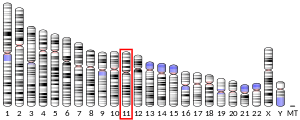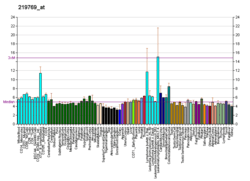INCENP
Inner centromere protein is a protein that in humans is encoded by the INCENP gene.[5][6][7]
| Chromosome passenger complex (CPC) protein INCENP N terminal | |||||||||
|---|---|---|---|---|---|---|---|---|---|
| Identifiers | |||||||||
| Symbol | INCENP_N | ||||||||
| Pfam | PF12178 | ||||||||
| InterPro | IPR022006 | ||||||||
| |||||||||
| Inner centromere protein, ARK binding region | |||||||||
|---|---|---|---|---|---|---|---|---|---|
| Identifiers | |||||||||
| Symbol | INCENP_ARK-bind | ||||||||
| Pfam | PF03941 | ||||||||
| InterPro | IPR005635 | ||||||||
| |||||||||
In mammalian cells, two broad groups of centromere-interacting proteins have been described: constitutively binding centromere proteins and 'passenger' (or transiently interacting) proteins.[8] The constitutive proteins include CENPA (centromere protein A), CENPB, CENPC1, and CENPD.
The term 'passenger proteins' encompasses a broad collection of proteins that localize to the centromere during specific stages of the cell cycle.[9] These include CENPE; MCAK; KID; cytoplasmic dynein (e.g., DYNC1H1); CliPs (e.g. CLIP1); and CENPF/mitosin (CENPF). The inner centromere proteins (INCENPs),[5] the initial members of the passenger protein group, display a broad localization along chromosomes in the early stages of mitosis but gradually become concentrated at centromeres as the cell cycle progresses into mid-metaphase. During telophase, the proteins are located within the midbody in the intercellular bridge, where they are discarded after cytokinesis.[7][10]
INCENP is a regulatory protein in the chromosome passenger complex. It is involved in regulation of the catalytic protein Aurora B. It performs this function in association with two other proteins - Survivin and Borealin. These proteins form a tight three-helical bundle. The N-terminal domain of INCENP is the domain involved in formation of this three-helical bundle.[11]
Interactions
INCENP has been shown to interact with H2AFZ,[12] Survivin[13] and CDCA8.[14] The ARK binding region has been found to be necessary and sufficient for binding to aurora-related kinase. This interaction has been implicated in the coordination of chromosome segregation with cell division in yeast.[15]
References
- GRCh38: Ensembl release 89: ENSG00000149503 - Ensembl, May 2017
- GRCm38: Ensembl release 89: ENSMUSG00000024660 - Ensembl, May 2017
- "Human PubMed Reference:". National Center for Biotechnology Information, U.S. National Library of Medicine.
- "Mouse PubMed Reference:". National Center for Biotechnology Information, U.S. National Library of Medicine.
- Earnshaw WC, Cooke CA (Sep 1991). "Analysis of the distribution of the INCENPs throughout mitosis reveals the existence of a pathway of structural changes in the chromosomes during metaphase and early events in cleavage furrow formation". J Cell Sci. 98 (4): 443–61. PMID 1860899.
- Adams RR, Eckley DM, Vagnarelli P, Wheatley SP, Gerloff DL, Mackay AM, Svingen PA, Kaufmann SH, Earnshaw WC (Jul 2001). "Human INCENP colocalizes with the Aurora-B/AIRK2 kinase on chromosomes and is overexpressed in tumour cells". Chromosoma. 110 (2): 65–74. doi:10.1007/s004120100130. PMID 11453556.
- "Entrez Gene: INCENP inner centromere protein antigens 135/155kDa".
- Choo, K. H. Andy (1997). The centromere. Oxford [Oxfordshire]: Oxford University Press. ISBN 978-0-19-857780-5.
- Earnshaw WC, Mackay AM (September 1994). "Role of nonhistone proteins in the chromosomal events of mitosis". FASEB J. 8 (12): 947–56. doi:10.1096/fasebj.8.12.8088460. PMID 8088460.
- Cutts SM, Fowler KJ, Kile BT, Hii LL, O'Dowd RA, Hudson DF, Saffery R, Kalitsis P, Earle E, Choo KH (July 1999). "Defective chromosome segregation, microtubule bundling and nuclear bridging in inner centromere protein gene (Incenp)-disrupted mice". Hum. Mol. Genet. 8 (7): 1145–55. doi:10.1093/hmg/8.7.1145. PMID 10369859.
- Jeyaprakash, A. A.; Klein, U. R.; Lindner, D.; Ebert, J.; Nigg, E. A.; Conti, E. (2007). "Structure of a Survivin–Borealin–INCENP Core Complex Reveals How Chromosomal Passengers Travel Together". Cell. 131 (2): 271–285. doi:10.1016/j.cell.2007.07.045. PMID 17956729.
- Rangasamy D, Berven L, Ridgway P, Tremethick DJ (April 2003). "Pericentric heterochromatin becomes enriched with H2A.Z during early mammalian development". EMBO J. 22 (7): 1599–607. doi:10.1093/emboj/cdg160. PMC 152904. PMID 12660166.
- Wheatley SP, Carvalho A, Vagnarelli P, Earnshaw WC (June 2001). "INCENP is required for proper targeting of Survivin to the centromeres and the anaphase spindle during mitosis". Curr. Biol. 11 (11): 886–90. doi:10.1016/S0960-9822(01)00238-X. PMID 11516652.
- Gassmann R, Carvalho A, Henzing AJ, Ruchaud S, Hudson DF, Honda R, Nigg EA, Gerloff DL, Earnshaw WC (July 2004). "Borealin: a novel chromosomal passenger required for stability of the bipolar mitotic spindle". J. Cell Biol. 166 (2): 179–91. doi:10.1083/jcb.200404001. PMC 2172304. PMID 15249581.
- Leverson JD, Huang HK, Forsburg SL, Hunter T (April 2002). "The Schizosaccharomyces pombe aurora-related kinase Ark1 interacts with the inner centromere protein Pic1 and mediates chromosome segregation and cytokinesis". Mol. Biol. Cell. 13 (4): 1132–43. doi:10.1091/mbc.01-07-0330. PMC 102257. PMID 11950927.
Further reading
- Ainsztein AM, Kandels-Lewis SE, Mackay AM, Earnshaw WC (1999). "INCENP centromere and spindle targeting: identification of essential conserved motifs and involvement of heterochromatin protein HP1". J. Cell Biol. 143 (7): 1763–74. doi:10.1083/jcb.143.7.1763. PMC 2175214. PMID 9864353.
- Martineau-Thuillier S, Andreassen PR, Margolis RL (1999). "Colocalization of TD-60 and INCENP throughout G2 and mitosis: evidence for their possible interaction in signalling cytokinesis". Chromosoma. 107 (6–7): 461–70. doi:10.1007/s004120050330. PMID 9914378.
- Dias Neto E, Correa RG, Verjovski-Almeida S, et al. (2000). "Shotgun sequencing of the human transcriptome with ORF expressed sequence tags". Proc. Natl. Acad. Sci. U.S.A. 97 (7): 3491–6. doi:10.1073/pnas.97.7.3491. PMC 16267. PMID 10737800.
- Wheatley SP, Kandels-Lewis SE, Adams RR, et al. (2001). "INCENP binds directly to tubulin and requires dynamic microtubules to target to the cleavage furrow". Exp. Cell Res. 262 (2): 122–7. doi:10.1006/excr.2000.5088. PMID 11139336.
- Wheatley SP, Carvalho A, Vagnarelli P, Earnshaw WC (2001). "INCENP is required for proper targeting of Survivin to the centromeres and the anaphase spindle during mitosis". Curr. Biol. 11 (11): 886–90. doi:10.1016/S0960-9822(01)00238-X. PMID 11516652.
- Strausberg RL, Feingold EA, Grouse LH, et al. (2003). "Generation and initial analysis of more than 15,000 full-length human and mouse cDNA sequences". Proc. Natl. Acad. Sci. U.S.A. 99 (26): 16899–903. doi:10.1073/pnas.242603899. PMC 139241. PMID 12477932.
- Parra MT, Viera A, Gómez R, et al. (2003). "Dynamic relocalization of the chromosomal passenger complex proteins inner centromere protein (INCENP) and aurora-B kinase during male mouse meiosis". J. Cell Sci. 116 (Pt 6): 961–74. doi:10.1242/jcs.00330. PMID 12584241.
- Rangasamy D, Berven L, Ridgway P, Tremethick DJ (2003). "Pericentric heterochromatin becomes enriched with H2A.Z during early mammalian development". EMBO J. 22 (7): 1599–607. doi:10.1093/emboj/cdg160. PMC 152904. PMID 12660166.
- Honda R, Körner R, Nigg EA (2004). "Exploring the functional interactions between Aurora B, INCENP, and survivin in mitosis". Mol. Biol. Cell. 14 (8): 3325–41. doi:10.1091/mbc.E02-11-0769. PMC 181570. PMID 12925766.
- Wheatley SP, Henzing AJ, Dodson H, et al. (2004). "Aurora-B phosphorylation in vitro identifies a residue of survivin that is essential for its localization and binding to inner centromere protein (INCENP) in vivo". J. Biol. Chem. 279 (7): 5655–60. doi:10.1074/jbc.M311299200. PMID 14610074.
- Ota T, Suzuki Y, Nishikawa T, et al. (2004). "Complete sequencing and characterization of 21,243 full-length human cDNAs". Nat. Genet. 36 (1): 40–5. doi:10.1038/ng1285. PMID 14702039.
- Gassmann R, Carvalho A, Henzing AJ, et al. (2004). "Borealin: a novel chromosomal passenger required for stability of the bipolar mitotic spindle". J. Cell Biol. 166 (2): 179–91. doi:10.1083/jcb.200404001. PMC 2172304. PMID 15249581.
- Li X, Sakashita G, Matsuzaki H, et al. (2004). "Direct association with inner centromere protein (INCENP) activates the novel chromosomal passenger protein, Aurora-C". J. Biol. Chem. 279 (45): 47201–11. doi:10.1074/jbc.M403029200. PMID 15316025.
- Gerhard DS, Wagner L, Feingold EA, et al. (2004). "The status, quality, and expansion of the NIH full-length cDNA project: the Mammalian Gene Collection (MGC)". Genome Res. 14 (10B): 2121–7. doi:10.1101/gr.2596504. PMC 528928. PMID 15489334.
- Zhu C, Bossy-Wetzel E, Jiang W (2005). "Recruitment of MKLP1 to the spindle midzone/midbody by INCENP is essential for midbody formation and completion of cytokinesis in human cells". Biochem. J. 389 (Pt 2): 373–81. doi:10.1042/BJ20050097. PMC 1175114. PMID 15796717.
- Chen HL, Tang CJ, Chen CY, Tang TK (2005). "Overexpression of an Aurora-C kinase-deficient mutant disrupts the Aurora-B/INCENP complex and induces polyploidy". J. Biomed. Sci. 12 (2): 297–310. doi:10.1007/s11373-005-0980-0. PMID 15917996.
- Vader G, Kauw JJ, Medema RH, Lens SM (2006). "Survivin mediates targeting of the chromosomal passenger complex to the centromere and midbody". EMBO Rep. 7 (1): 85–92. doi:10.1038/sj.embor.7400562. PMC 1369225. PMID 16239925.
- Goto H, Kiyono T, Tomono Y, et al. (2006). "Complex formation of Plk1 and INCENP required for metaphase-anaphase transition". Nat. Cell Biol. 8 (2): 180–7. doi:10.1038/ncb1350. PMID 16378098.




